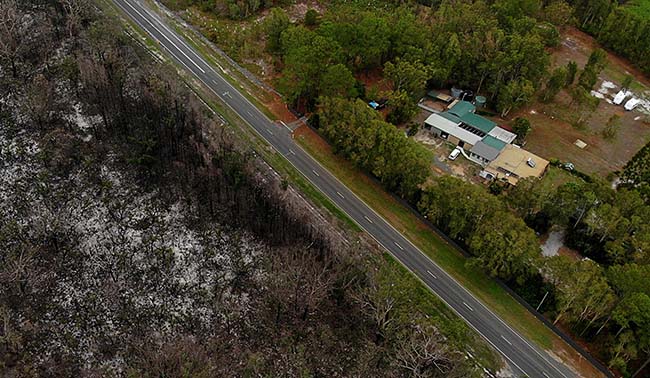Communities around the world are facing the challenge of rebuilding their homes and critical infrastructure after floods, bushfires and storms. This research theme will provide insights for how we can build and retrofit infrastructure to be resilient and to support resilient communities as extreme weather events increase in severity and occurrence, under life in the Anthropocene.

Our projects
About
2022-2023
The global community is faced with the daunting task of rebuilding their homes and critical infrastructure in the aftermath of natural disasters such as floods, bushfires, and storms. Our project aims to explore how water infrastructure can be made more resilient to cope with the increasing frequency and intensity of extreme weather events that are common in the Anthropocene era. Water infrastructure is more than just engineered components. It involves human, technological, and environmental interactions that impact resilience. Due to unpredictable weather conditions, social and environmental factors must be considered to develop water infrastructure in this era. The study explores the essential social and environmental factors that need consideration when creating water infrastructure and defining it in the Anthropocene era.
Rethinking Water Governance and Sustainable Infrastructure of Central Chile in Extreme Weather Events
In line with the SIRH’s strategy to foster international partnerships, scholars from the University of Queensland, Australia engaged in a collaborative endeavour with their counterparts from Adolfo Ibanez University (AIU) in Chile. This fruitful collaboration, which spanned from March 22 to 30, 2023 aimed to gain an intimate understanding of sustainable infrastructure and water security measures employed in central Chile. Throughout their visit, the academics delved into the intricacies of various local infrastructure projects.
Marking the conclusion of the visit to Chile, the team jointly organized two comprehensive workshops on March 29th and 30th. These sessions were designed to probe issues prevalent in both Chile and Australia, including water security, governance, and the role of infrastructure. The overarching objective of these activities was to confront the immediate and critical impacts of climate change.
Publications
- Chile Water newsletter
Researchers
 Pablo Aranda Valenzuela
Pablo Aranda Valenzuela
Research Assistant
Australian Institute for Business and Economics
 Dr Cristyn Meath
Dr Cristyn Meath
Senior Research Fellow and Lecturer
Faculty of Business, Economics and Law
 Dr Jurij Karlovsek
Dr Jurij Karlovsek
Senior Lecturer, School of Civil Engineering
Faculty of Engineering, Architecture and IT
About
Freshwater availability is becoming increasingly focused on water security, which refers to people's access to enough safe and affordable water to meet their daily needs, including food production and subsistence. Unfortunately, water scarcity and insecurity already affect many parts of the developing world. In the last century, global water demand has increased by six times. Almost 40% of the world's population, or nearly three billion people, live in areas where water demand exceeds supply. This, along with the rise in extreme weather events, means we must rethink and revise our ideas about water security. Without access to safe water, a nation's development can be profoundly impacted, as water is essential for life, both directly through consumption and indirectly through agriculture and industry. The study investigates through frames analysis how different actors perceive problems and prioritise solutions for water security in the context of a water crisis and the role and implications of infrastructure.
Researchers
 Pablo Aranda Valenzuela
Pablo Aranda Valenzuela
Research Assistant
Australian Institute for Business and Economics
 Dr Cristyn Meath
Dr Cristyn Meath
Senior Research Fellow and Lecturer
Faculty of Business, Economics and Law
 Dr Jurij Karlovsek
Dr Jurij Karlovsek
Senior Lecturer, School of Civil Engineering
Faculty of Engineering, Architecture and IT
About
Freshwater availability is becoming increasingly focused on water security, which refers to people's access to enough safe and affordable water to meet their daily needs, including food production and subsistence. Unfortunately, water scarcity and insecurity already affect many parts of the developing world. In the last century, global water demand has increased by six times. Almost 40% of the world's population, or nearly three billion people, live in areas where water demand exceeds supply. This, along with the rise in extreme weather events, means we must rethink and revise our ideas about water security. Without access to safe water, a nation's development can be profoundly impacted, as water is essential for life, both directly through consumption and indirectly through agriculture and industry. The study investigates through frames analysis how different actors perceive problems and prioritise solutions for water security in the context of a water crisis.
Publications
- Chile Water newsletter
Researchers
 Pablo Aranda Valenzuela
Pablo Aranda Valenzuela
Research Assistant
Australian Institute for Business and Economics
 Dr Cristyn Meath
Dr Cristyn Meath
Senior Research Fellow and Lecturer
Faculty of Business, Economics and Law
 Dr Jurij Karlovsek
Dr Jurij Karlovsek
Senior Lecturer, School of Civil Engineering
Faculty of Engineering, Architecture and IT
